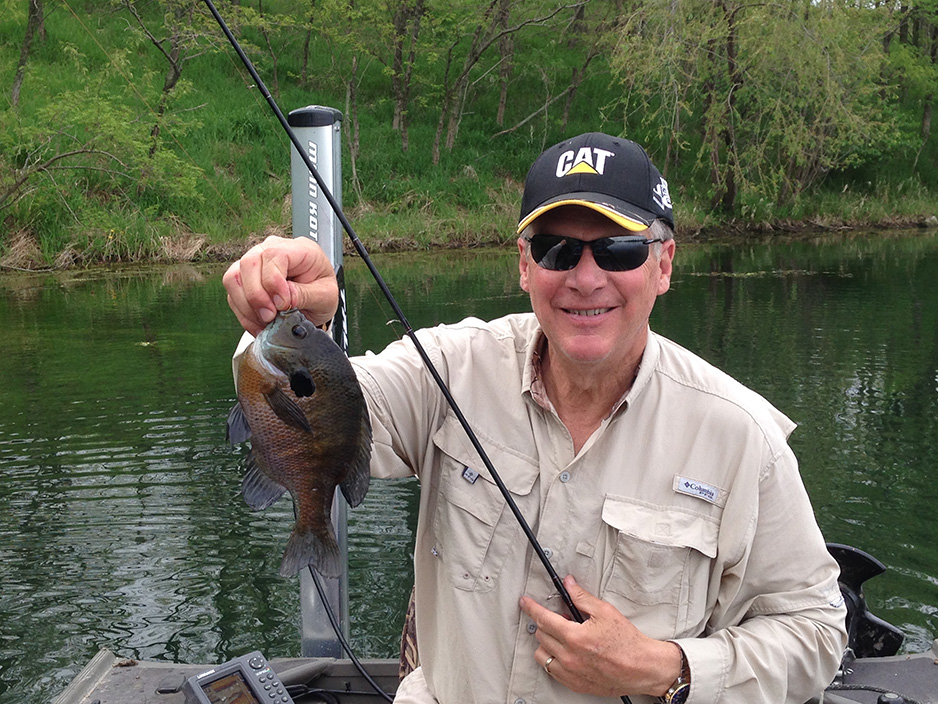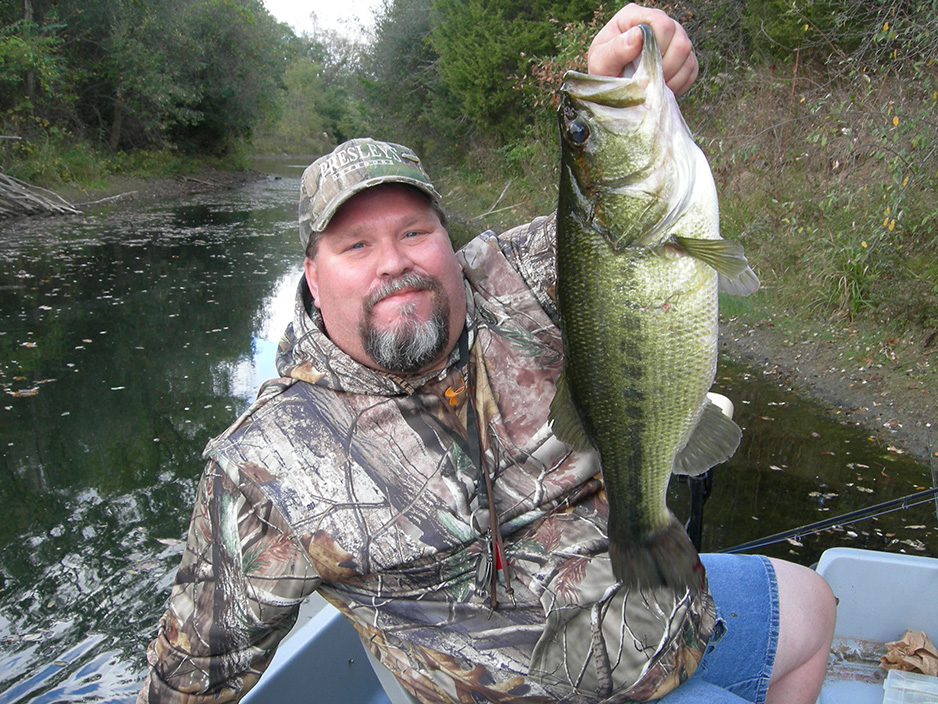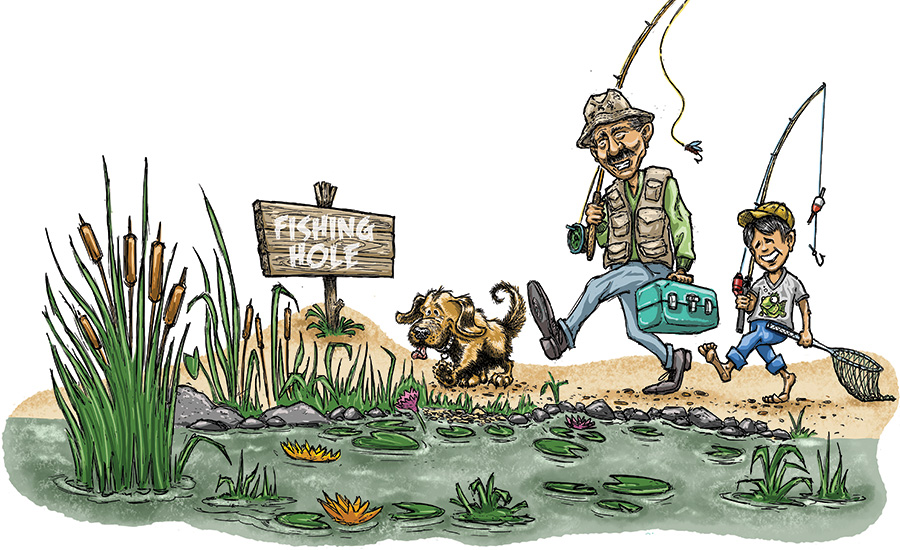The Peoria area offers an abundance of opportunities to fish, hunt or just watch wildlife
Some of the most desirable land in central Illinois for home sites and recreation was once viewed as worthless. “Wasteland” was the actual word used in plat books of the 1960s and 1970s to describe land that was surface mined for coal.
Also known as strip mining, the process of peeling back 75 to 100 feet of rock and soil to reach the coal below can leave ugly scars on the landscape. Those gashes are still visible on properties mined prior to the state’s 1962 Open Cut Land Reclamation Act and the federal Surface Mining Control and Reclamation Act of 1977.
On pre-reclamation properties, you’ll see rocks scattered on the surface and lakes that are bordered by rocky outcroppings jutting up in rows where the coal was removed. Lands mined after 1977 are harder to identify as coal mines, except for the presence of narrow, deep lakes surrounded by rolling, grassy hills and trees.
Those differences aside, nearly all former strip mines share a common trait: They are meccas for wildlife and for human recreation.
Whether you like fishing or hunting or prefer paddling and wildlife watching, some of the best places to spend an enjoyable day outdoors in central Illinois are in strip-mine country. Peoria residents are blessed to live within 40 minutes of an abundance of such properties in Peoria, Knox, Fulton and Stark counties.
Another blessing is that while most of the state’s 200,000 acres of former surface mines are privately owned, there are also many nearby areas open to the general public (see sidebar).
We are entering a perfect month for fishing strip mines, which are typically deep, steep-sided bodies of water with limited underwater structure. But in May, when you can find underwater structure — rock piles, downed trees or weedy flats — you should find fish. Chances are, if you’ve got a friend who regularly shows off pictures of big bass, bluegill or crappie, they either own a strip-mine lake or have access to one.


It’s no coincidence that several Illinois record fish were hauled out of lakes created by mining. That list includes Ed Walbel’s 13-pound, 1-ounce record largemouth bass and Rick Leonard’s record spotted bass of 7 pounds, 3.12 ounces caught in Fulton County. Up until 2021, Mark Samp also held the state record for smallmouth bass with a 6-pound, 7-ounce lunker caught near Farmington. A Fulton County surface mine also produced the record 5-pound, 6-ounce record black bullhead.
A similar excitement builds in strip-mine country in the fall, when the pits attract ducks and geese and provide a waterfowling alternative to Illinois River backwaters. In fact, strip-mine lakes in Fulton and Knox counties were among the first places that the state released Canada geese in the late 1960s.
What makes strip-mine country so appealing to wildlife is the combination of large, relatively undisturbed tracts of grass and water that are otherwise rare in an Illinois landscape dominated by corn and soybeans. The most obvious critters to benefit are trophy species such as bass, Canada geese, ducks and deer. But the impact goes beyond game species to birds, reptiles, amphibians and insects.
Grassland birds are among the state’s most threatened critters, but they can often be found in strip-mine country, where it’s not unusual to see short-eared owls or harrier hawks, both endangered in Illinois. Look more closely and you’ll discover even more crawling through the grass or along the edges of the lakes.
“We conclude that mine spoil prairie reclamations can support roughly the same degree of amphibian richness as native prairie restorations,” writes scientist Michael J. Lannoo, who has done extensive research in strip mines.
The restored lakes also attract humans and have become a hotspot for development. That’s why an 8-acre lot of reclaimed strip-mine ground in Peoria County is currently listing for $275,000, and why land with access to a strip pit regularly brings upwards of $6,000 per acre. No wonder old-timers in strip-mine country are often heard to lament, “I should have bought that ground when it was cheap!”
Too late. The former coal mine “wastelands” have been transformed into gold mines for recreation.
Wanna go fishing and more?
Here are five spots
By Jeff Lampe
Central Illinois anglers, hunters, paddlers and birdwatchers who want to spend time in strip-mine country have plenty of public options available within a 40-minute drive of Peoria. Here are a few:
Banner Marsh
This 4,363-acre Illinois Fish and Wildlife Area offers good to very good fishing for bass, crappie and muskie. And with more than 2,400 acres of water and numerous small ponds, there’s plenty for paddlers to explore. The site also offers waterfowl, deer, dove and upland game hunting in the fall. There are no fees for fishing. Boats with motors over 25 hp are limited to no wake. Located along U.S. Route 24, 15 miles southwest of Peoria. (309) 647-9184.
Double T
This 1,961-acre State Fish and Wildlife Area is located in Fulton County, north of Canton at 18000 E. Cypress Rd. The 65-acre main T-lake has depths of 65 feet and is rated as good for crappie and largemouth bass, with a developing population of muskie. There also is hunting for waterfowl and doves. (309) 647-9184.
Fulton County Camping & Recreation Area
The Fulton County Board leases this 440-acre parcel, which contains 12 lakes, 134 acres of surface water and boat ramps. Bluegill, crappie and bass are all rated as good with redear sunfish very good. Fees for fishing and camping. Located southwest of St. David, off Illinois Route 100. (309) 668-2931.
Lakeland Park
This 600-acre property operated by the Canton Park District and open from April through October features five lakes, more than five miles of hiking trails, picnic shelters, boat ramps, fishing opportunities and even scuba diving. There are entry fees and a $1 daily boat-launch fee ($30 for the season). Located just west of Canton off West Vine Street. (309) 647-4702.
Snakeden Hollow
A 2,500-acre State Fish and Wildlife Area in Knox County, two miles east of Victoria, Snakeden features 165-acre McMaster Lake and approximately 34 bodies of water over 1 acre in size that can be reached from parking areas surrounding the property. Gravels paths allow foot or bicycle traffic. Most ponds offer good fishing for bluegill and bass and average fishing for crappie and catfish. (309) 879-2607.




